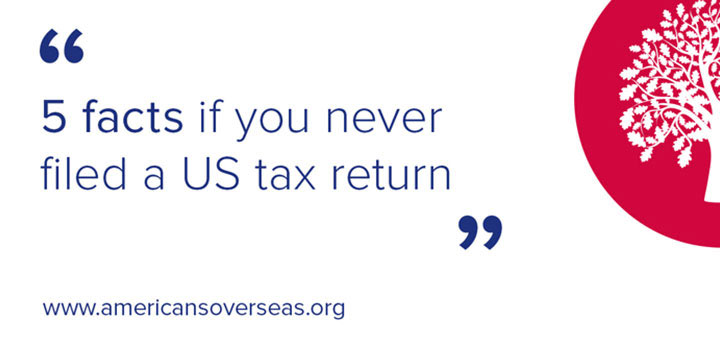
Checklist voordat u contact opneemt met een advocaat of belastingadviseur – Deel 2

In the second part of this two part editorial John Richardson, who is a Canadian based lawyer, shares his advice and considerations before contacting professional tax support. The first five from last week:
- Investigate the “State” (no pun intended) of your U.S. citizenship
- Emotional considerations are as important as tax considerations
- It is important that you respond well informed and NOT react on 1st impulse!
- A “response” requires that you investigate your possible U.S. tax liability
- A response requires that you understand your U.S. tax compliance options
6. A response requires that you consider how your response may affect your local tax situation
Remember that a course of action that might make sense from a U.S. perspective, could be harmful from a local tax law perspective. Remember that the sale of assets will generally trigger a tax liability somewhere.
To put it simply: Every U.S. action will have a local tax law reaction and vice-versa.
7. Compliance decisions are rarely susceptible to “black and white answers” – That’s why a decision is required
Although you must come to a decision, you must also understand that there is NO “black and white answer” to the compliance question. Don’t think in terms of right and wrong decisions. Think in terms of “better vs. worse” decisions. Consider your personal circumstances. How complicated is your situation? What is your tolerance for risk?
By its very nature, anything that requires a decision is NOT clear.
8. Chances are you will NOT be happy with any course of action
There is NO option that you will be happy about. That said, some options are worse than others.
If you do nothing you are running the risk of being discovered and may worry about the risk of discovery.
- If you attempt to clean up past problems, it may be financially crippling.
- If you comply on a “going forward basis” you may worry about the past.
9. Choosing among compliance options is largely about choosing among emotional outcomes. Do you prefer to live with anger or anxiety?
Because of the injustice of the application of U.S. tax laws to Americans Overseas you may be left with a healthy dose of residual anger. You thought you were investing in mutual funds to save for retirement. The accountants and lawyers tell you that the IRS regards mutual funds as investments to confiscate. The injustice is extreme! Anger is inevitable. Anger is difficult to live with. If you comply on a “going forward” basis you will have greater anxiety. Therefore, compliance options must be viewed in terms of both “objective” and “subjective” considerations.
A. Objective – What is the perceived compliance result of your choice and what are the financial costs?
B. Subjective – What is the emotional state you are left with. For many this is a choice between extreme anger and extreme anxiety. What is the emotional cost?
10. Understand the reality of lawyers and accountants
They are working for the IRS but are being paid by you. They may be friendly, but they are not your friend. Some of them must interact with the IRS in their professional lives. Those lawyers, accountants and EAs (“Enrolled Agents”) who appear before the IRS are subject to IRS rules of practice. These rules are found in Circular 230. This is an important and is developed in the video referenced in the following tweet:
Lawyers and accountants cannot tell you to NOT come into compliance!
Therefore, don’t ask them that question. Their job is to explain to you the consequences of all available options, actions and possible reactions. You and only you are responsible for making the decision that is appropriate to your situation. I urge you to take responsibility for that decision.
11. Coming into compliance will solve one problem but will create another (possibly bigger) problem
There are two kinds of U.S. citizens abroad who have problems:
A. U.S. citizens abroad who are NOT compliant with U.S. “tax laws”.
They are forced to endure the continual threats of penalties from the IRS, the media and the compliance industry. Note that there are two kinds of “non-compliant” Americans abroad.
First: Those who have NOT been filing and are NOT in the system.
Second: Those who have been filing, thought they were compliant, but learn that they have been filing incorrectly (very common).
B. U.S. citizens abroad who ARE compliant with U.S. “tax laws”.
U.S. citizens abroad who are tax compliant also have massive problems. Taxpayer-advocate reports that for U.S. Citizens Abroad, tax compliance is somewhere between difficult and impossible.
U.S. Tax compliance:
- is impossibly financially expensive for the average person;
- will consume an unjustifiable amount of time and stress;
- means that you will be unable to engage in normal retirement planning.
To put it another way: coming into U.S. tax compliance will solve one set of problems. But, it will create a new set of problems. Once you are compliant, you must stay compliant! The problem of “staying in compliance” is enough to make people seriously consider renunciation of U.S. citizenship.
Two final pieces of advice:
- Educate yourself and consider this list before involving a “cross-border” professional!
- You should neither sell nor acquire any investments without determining the U.S. tax consequences! You do NOT want to make the situation worse!
Sometimes the hardest part of life is NOT making a decision, but learning HOW to make a decision.
John Richardson is a Toronto-based lawyer with a clear understanding of the legal, tax, Retirement Planning, and investment climate in Canada. He also has a good understanding of the obligations of U.S. citizens abroad. He provides “citizenship counseling” for U.S. citizens abroad. Quote: The truth is that citizenship counseling is a form of life counseling.



